- Home
- Diane Gaston
Gallant Officer, Forbidden Lady Page 3
Gallant Officer, Forbidden Lady Read online
Page 3
‘She has seen it,’ Jack responded. ‘She is here. She and my mother. They are this moment repairing a tear in my mother’s gown. They should return soon.’
‘I am astonished.’ Sir Cecil blinked. ‘It is unlike your mother to come to London, is it not?’
His mother had not been in London since his father died, so many years ago. ‘She wished to be here for this, I think.’
That was only part of the reason. The truth was, his mother had come to London because Tranville, the man who’d made her his mistress, had also come to town.
When Jack’s father, the nephew of an earl, had been an officer in the Life Guards, the whole family lived in London. John and Mary Vernon were accepted everywhere, and Jack could remember them dressed in finery, ready for one ball or another. All that changed with his father’s death. Suddenly there were too many debts to pay and not enough money to pay them. Jack’s mother moved them to Bath where Tranville took notice of the pretty young widow and put her under his protection.
Jack’s mother always insisted Tranville had been the family’s salvation, but as Jack got older, he realised she could have appealed to his father’s uncle. The earl would not have allowed them to starve. Once his mother chose Tranville and abandoned all respectability, his great-uncle washed his hands of them.
Sir Cecil patted Jack on the arm. ‘It is good your mother and sister have come. How long do they stay?’
Jack shrugged. ‘It depends.’
Depends upon how long Tranville remained in London, Jack suspected. Jack’s mother was a foolish woman. Tranville had been no more faithful to her than he’d been to his own wife. He did return to her from time to time, between other conquests.
Matters were different now. Tranville had unexpectedly inherited a barony and become even more wealthy than before. Shortly thereafter, his wife died. Since suddenly becoming a rich, titled and eligible widower, he’d not called upon Jack’s mother at all. There was no reason to expect him to do so while she was in London.
Jack cleared his throat. ‘My mother and sister have taken rooms on Adam Street, a few doors from my studio.’
‘You have established a studio?’ Sir Cecil beamed with approval. ‘Excellent, my boy.’
Tranville’s money paid for his mother’s rooms. Practically every penny she possessed came from him. He had thus far kept his promise to support her for life. His money had kept her and her children in great comfort. It had paid for Jack’s education and his commission in the army. Jack swore he would pay that money back some day.
‘The studio is not much,’ Jack admitted to Sir Cecil. ‘Little more than a room to paint and a room to sleep, but the light is good.’
‘And the address is acceptable,’ added the older man, thoughtfully.
The address was not prestigious, but it was an area of town near both Covent Garden and the Adelphi Buildings, which attracted respectable residents.
‘I should like to see it,’ Sir Cecil said. ‘And to call upon your mother. I am in London for a few weeks. My son, you know, is studying architecture here at the Academy.’
‘I hope to see you both, then.’ Jack spied his mother and sister searching through the crowd. ‘One moment, sir. My mother and Nancy approach.’
Nancy caught sight of him and waved. She led their mother to where Jack stood. Sir Cecil greeted them warmly.
‘Jack.’ Nancy’s eyes sparkled with excitement. ‘I cannot tell you how many people have asked me if I am the young lady in your portrait. I told them all the direction of your studio.’
His mother lifted her eyebrows. ‘I would say some of those enquiries were from very impertinent gentlemen.’
Jack straightened and glanced around the room.
‘Do not get in a huff, Brother.’ Nancy laughed. ‘I came to no harm. It was mere idle curiosity on their part, I am certain.’
Jack was not so certain. He worried about Nancy in London. With her dark hair, fair complexion and bright blue eyes, she was indeed as fresh and lovely as the incomparable Ariana had said. Jack worried about Nancy’s future even more. What chance did she have to meet eligible gentlemen? What sort of man would marry the dowerless daughter of a kept woman?
He frowned.
His mother touched his arm. ‘I confess to being fatigued, my son. How much longer do you wish to stay?’
He glanced around the room. The crowd was suddenly thinning. The afternoon had grown late and many of those in attendance would be heading to their townhouses in Mayfair. Some of them, perhaps, would take their carriages for a turn in Hyde Park before returning home. It was the fashionable hour to ride through the park.
Jack, his mother, and sister would walk to Adam Street.
‘We may leave now, if you like.’ Jack glanced around the room again, hoping for one more glimpse of Ariana.
Luck was with him when he and Sir Cecil escorted his mother and sister to the door. Ariana appeared a few steps ahead, but there was no question of approaching her. She and her companion walked with two wealthy-looking and attentive gentlemen.
Jack pushed aside his flash of envy. Instead, he focused on the way she carried herself, the graceful nature of her walk. He watched how her pale pink gown swirled about her legs with each step, how the blue shawl draped around her shoulders moved with each sway of her hips.
Jack watched her as they reached the outside and crossed the courtyard. No more than five feet behind her, he might as well have been a mile. Her party continued to the Strand where a line of carriages waited. In a moment Jack would have to head towards home. This would be his last glimpse of her.
She turned and caught sight of him. Her face lit up and took his breath away. His gaze locked with hers, and he thought he sensed the same regret in her eyes that was gnawing at his insides.
One of the gentlemen accompanying her took her arm. ‘The carriage, my dear,’ he said in a proprietary tone, apparently unaware of Jack staring at her.
She turned back one more time and found him again. ‘Goodbye,’ she mouthed before being assisted into a shiny, elegant barouche.
Jack watched her until he could see the barouche no more. He tried to engrave her image upon his memory but could feel it fading with each moment. He needed to reach his studio. He needed paper and pencil. He needed to draw her before the image was lost to him as well.
Chapter Two
London—January 1815
This chilly January night, Jack escorted his mother and sister to the theatre. His latest commission, a wealthy banker, offered Jack the use of his box to see Edmund Kean in Romeo and Juliet.
Jack had acquired some good commissions because of the exhibition, until the oppressive heat of August drove most of the wealthy from London. The banker, Mr Slayton, was his final one. Jack’s mother and sister also returned to Bath, but they came back to London with the new year. Jack had placed an advertisement seeking some fresh commissions in the Morning Post, but, thus far, no one had answered it.
Jack tried to set his financial worries aside as he assisted his mother to her seat in the theatre box. Sir Cecil’s son, Michael, was also in their company attending Jack’s sister. Michael, as kind-faced as his father, but tall, dark-haired and slim, continued with his architectural studies and had again become a frequent addition to Jack’s mother’s dinner table now that she and Nancy were back in London.
As Nancy took her seat, it was clear she was already enjoying herself. ‘It is so beautiful from up here.’
They’d attended the theatre once the previous summer, but sat on the orchestra floor with the general admission. From the theatre box the rich reds and gleaming golds of the décor were displayed in all their splendour.
Nancy turned to Jack. ‘Thank you so much for bringing us.’
He was glad she was pleased. ‘You should thank Mr Slayton for giving me the tickets.’
‘Oh, I do.’ She turned to their mother. ‘Perhaps we should write him a note of gratitude.’
‘We shall do precisely that,’ h
er mother agreed.
‘Well, I am grateful, as well.’ Michael stood gazing out at the house. ‘This is a fine building.’
Nancy left her chair to stand beside him. ‘You will probably gaze all evening at the arches and ceiling and miss the play entirely.’
He grinned. ‘I confess they will distract me.’
She gave an exaggerated sigh. ‘But the play is Romeo and Juliet. How can you think of a building when you shall see quite possibly the most romantic play ever written?’
He laughed. ‘Miss Vernon, I could try to convince you that beautiful arches and elegant columns are romantic, but I suspect you will never agree with me.’
‘I am certain I will not.’ She nodded.
‘I remember coming here in my first Season.’ Jack’s mother spoke in a wistful tone. ‘Of course, that was the old theatre. There were not so many boxes in that auditorium.’
That Drury Lane Theatre burned down in 1809.
Nancy surveyed the crowd. ‘There are many grand people here.’
The play was quite well attended, even though most of the beau monde would not come to London for another month or so. Perhaps Jack’s commissions would increase then. Of course, with the peace, many people had chosen to travel to Paris or Vienna and would not be in London at all. Still, the theatre had an impressive crowd. Edmund Kean had been drawing audiences all year in a series of Shakespearean plays.
Nancy leaned even further over the parapet. ‘Mama, I see Lord Tranville.’
‘Do you?’ Jack’s mother’s voice rose an octave.
‘There.’ Nancy stepped aside so her mother could see. ‘The third balcony. Near the stage.’
‘I believe you are correct.’ Her voice was breathless.
Tranville stood with another gentleman in a box close to the stage, the two men in conversation while surveying the theatre. If Tranville spied his former mistress in the crowd, he made no show of it.
The curtain rose and Nancy and Michael sat in their chairs. Nancy’s gaze was riveted to the stage, but their mother’s drifted to the nearby box where Tranville sat.
Jack’s jaw flexed.
Edmund Kean walked on.
‘He is old!’ Nancy whispered.
Shakespeare had written Romeo as a young man who falls in love as only a young man could. Kean’s youth was definitely behind him. Still, Kean made an impressive figure in the costume of old Verona, moving about the stage in a dramatic manner. It would be a challenge to capture that movement in oils, Jack thought.
Artists such as Hogarth and Reynolds painted the famous actors and actresses, Kemble and Garrick, Sarah Siddons and Daphne Blane. The portraits were engraved and printed in magazines and on posters in order to entice people to the theatre. Jack straightened. Perhaps the theatre could provide him with a clientele. He might not get commissions for the principal actors, but maybe the lesser known ones, or maybe he could depict whole scenes as they occurred on the stage. If he could paint the action of battle, he could easily paint the action of a London stage.
The idea took firm root in Jack’s mind. His studio was quite near to Covent Garden, so it would be convenient for the actors. Or he could easily come to the theatre. He began to imagine the scene onstage as he might paint it. He was ready to assess every scene for its artistic potential.
Romeo spoke the lines about planning to attend the Capulets’ supper. He left the stage, and Lady Capulet and the nurse entered, looking for Juliet.
Jack’s fingers itched for a pencil, wishing to sketch Lady Capulet and the nurse with their heads together.
‘See,’ Nancy whispered to her mother. ‘Lady Capulet is Daphne Blane. Her natural daughter is playing Juliet.’
Jack had the notion he’d seen Daphne Blane before. Of course, she was a notorious beauty whose conquests were as legendary as her performances on stage so he might have seen her image somewhere. The birth of her natural daughter had been the scandal of its day with much speculation on who the father might be. Many artists had painted Daphne Blane’s portrait. Why not Jack?
Juliet made her entrance. ‘How now? Who calls?’
‘Your mother,’ the nurse replied.
Juliet faced the audience. ‘Madam, I am here…’
Jack nearly rose from his chair.
Ariana.
Juliet was Ariana. From this distance, her features were not clear, but she moved like Ariana, sounded like her. He’d found her. He’d despaired of ever doing so.
His eyes never left her while she was on stage. His fingers moved on the arm of the chair as if he were drawing the graceful arch of her neck, the sinuous curves of her body.
The intermission was almost torture, because he could not record her on paper and he had to act as if his world had not suddenly tumbled on its ear. As the curtain closed on the actors’ final bows, Jack remained in his seat, staring at the curtain.
Michael gave his hand to Jack’s mother to help her rise, and Jack noticed his mother glancing in the direction of Tranville’s box.
Nancy sprang to her feet, her hands pressed together. ‘Was it not splendid? I mean, it was so sad, but so lovely, did you not think?’
Jack smiled at her, still partially abstracted. ‘You enjoyed it, then?’
Her blue eyes shone with pleasure. ‘I adored it.’ Michael helped her on with her cloak. ‘Well, perhaps not Romeo. Mr Kean was not my idea of Romeo, I assure you.’
Michael grinned. ‘Was he not romantic enough?’
‘He was old.’ Nancy made a face.
Jack’s mother glanced over her shoulder once more as they all made their way to the door. Once they were out in the noisy, crowded hallway, Jack would lose his chance to talk to them.
He placed a hand on his mother’s arm. ‘I should like your permission to part from you here.’
His mother shook her head. ‘Forgive me, Jack. What did you say?’
‘I would bid you goodnight here.’ He turned to Michael. ‘Would you escort the ladies home?’
‘I would be honoured and delighted,’ Michael replied. ‘But this is a surprise. Why do you leave us?’
Jack’s primary reason was to go in search of Ariana, but he had no wish to tell them that. He’d give them a partial truth. ‘I had the notion that I might paint the actors performing their roles. I want to seek out the manager and give him my card.’
‘You would paint the actors?’ Nancy exclaimed. ‘Why, that would be splendid! The print shops are always full of prints of actors. How perfect since you are so close to the theatre.’
‘My thoughts precisely,’ he responded, knowing this was not true. It was far less complicated than explaining about Ariana, however. ‘I should be able to offer a reasonable price.’
Nancy nodded. ‘Very sensible, Jack.’
‘Proceed, my son,’ his mother said. ‘We will manage without you.’
His mother rarely complained, not even when Tranville failed to call upon her. It had been a year since he had bothered.
‘Then I bid you all goodnight.’ He leaned over and kissed his mother’s cheek.
Nancy smiled. ‘Thank you for bringing us, Jack.’
Michael made as if fighting with a sword. ‘Do not fret. I shall scare off any foes who dare to cross our path.’
Nancy giggled. ‘What nonsense. We shall take a hackney coach.’
Michael put his arm around her. ‘Yes, we shall, and I shall pay for it.’
Out in the hallway, they made for the theatre door and Jack for the stage. He did not know the location of the Green Room, where the actors and actresses gathered after the performance and where wealthy gentlemen went to arrange assignations with the loveliest of the women, but he suspected that would be where he would find Ariana.
Backstage he followed a group of wealthy-looking gentlemen, some carrying bouquets of flowers. Jack walked behind them, but suddenly stopped.
Tranville stood to the side of the door.
He still retained his military bearing, even though he was attired
in the black coat, white breeches and stockings that made up the formal dress of a gentleman. His figure remained trim and only his shock of white hair gave a clue that he was a man who had passed his fiftieth year.
Tranville, unfortunately, also saw Jack.
‘Jack!’ He stepped in the younger man’s path. ‘What are you doing here? Why are you not in Bath?’
Jack bristled. He’d never been able to disguise his dislike of this man, although when a child he doubted Tranville had even noticed. A few adolescent altercations with Tranville’s son Edwin had made the animosity clear and mutual. Jack never initiated the fisticuffs, but he always won and that rankled Tranville greatly.
Jack straightened and looked down on the older man. ‘I have business with the theatre manager.’
‘You?’ Tranville eyed him with surprise. ‘What business could you have with Mr Arnold?’
Jack felt an inward triumph. He now knew the manager’s name. ‘Business to be discussed with Mr Arnold.’
Tranville’s jaw flexed. ‘If it is theatre business, you may tell me. I am a member of the committee.’
‘The committee.’ This meant nothing to Jack.
Tranville averted his gaze for a moment. ‘The subcommittee for developing the theatre as a centre for national culture.’
Jack remembered it. Control of the theatre had been wrested from the debt-ridden owner, Richard Brinsley Sheridan, and given to a manager and a board of directors. A subcommittee of notables had been appointed, but Jack doubted they had access to the purse strings. Nevertheless, if Jack had encountered any other member of the subcommittee he would have spoken of how his art work could further the committee’s goals. This was Tranville blocking his way, however.
Jack maintained a steady gaze. ‘My business will not concern you.’
Jack would wager Tranville’s theatrical interests were in fostering liaisons with the actresses, not fostering national culture. Actresses and dancers encouraged the attentions of wealthy lords who wanted to indulge them with jewels and gowns and carriages.
He frowned. He had nothing to offer Ariana.

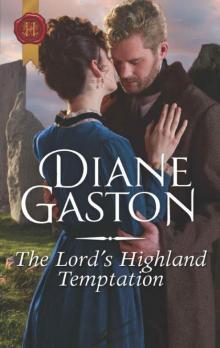 The Lord's Highland Temptation (HQR Historical)
The Lord's Highland Temptation (HQR Historical)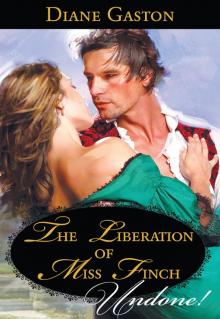 The Liberation of Miss Finch
The Liberation of Miss Finch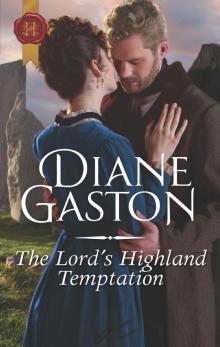 The Lord's Highland Temptation
The Lord's Highland Temptation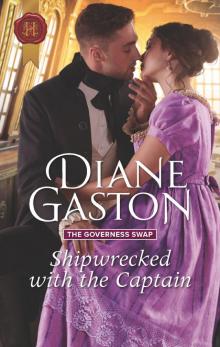 Shipwrecked with the Captain
Shipwrecked with the Captain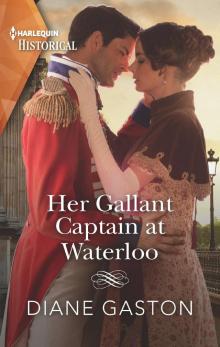 Her Gallant Captain at Waterloo
Her Gallant Captain at Waterloo Chivalrous Captain, Rebel Mistress
Chivalrous Captain, Rebel Mistress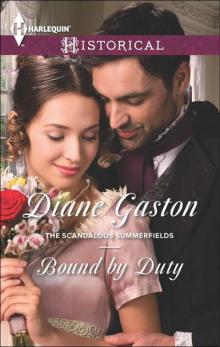 Bound by Duty
Bound by Duty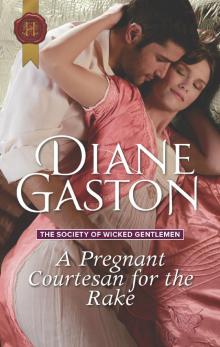 A Pregnant Courtesan for the Rake
A Pregnant Courtesan for the Rake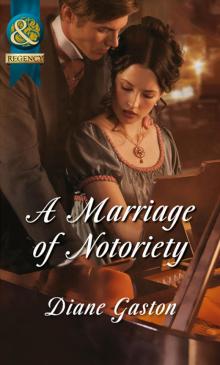 A Marriage of Notoriety
A Marriage of Notoriety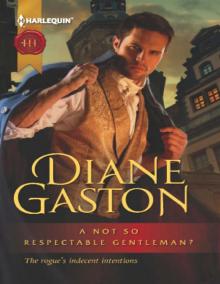 A Not So Respectable Gentleman?
A Not So Respectable Gentleman?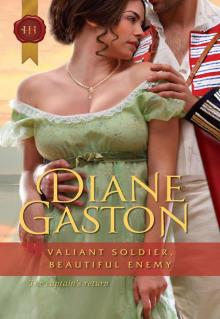 Valiant Soldier, Beautiful Enemy
Valiant Soldier, Beautiful Enemy A Reputation for Notoriety
A Reputation for Notoriety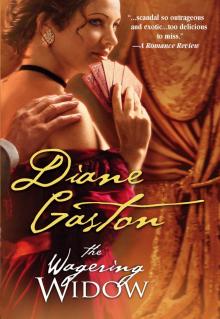 The Wagering Widow
The Wagering Widow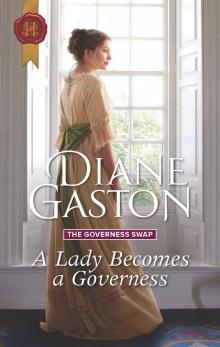 A Lady Becomes a Governess
A Lady Becomes a Governess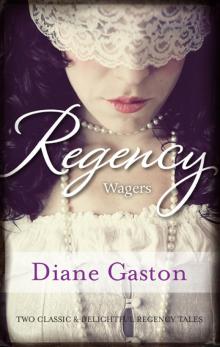 Regency Wagers
Regency Wagers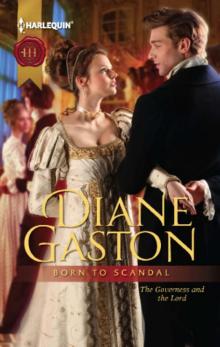 Born to Scandal
Born to Scandal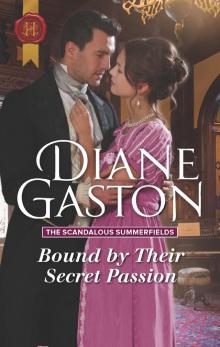 Bound by Their Secret Passion
Bound by Their Secret Passion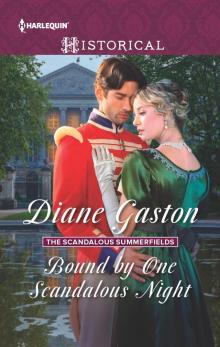 Bound by One Scandalous Night
Bound by One Scandalous Night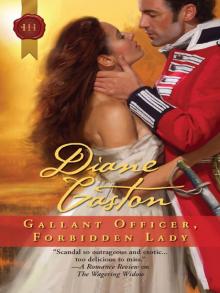 Gallant Officer, Forbidden Lady
Gallant Officer, Forbidden Lady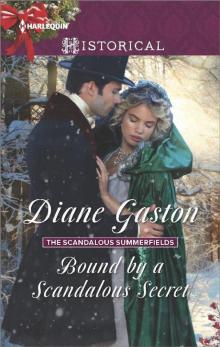 Bound by a Scandalous Secret (The Scandalous Summerfields)
Bound by a Scandalous Secret (The Scandalous Summerfields)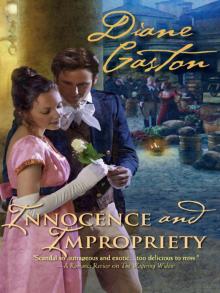 Innocence and Impropriety
Innocence and Impropriety